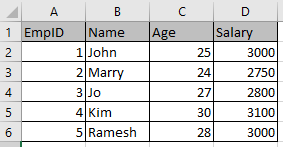PHP str_getcsv() Function
The PHP str_getcsv() function parses a CSV string and returns an array containing the fields read.
Note: The locale settings are taken into account by this function. If LC_CTYPE is e.g. en_US.UTF-8, files in one-byte encodings may be read wrongly by this function.
Syntax
str_getcsv(string, separator, enclosure, escape)
Parameters
string |
Required. Specify the string to parse. |
separator |
Optional. Specify the field delimiter (one single-byte character only). Default is comma ( , ) |
enclosure |
Optional. Specify the field enclosure character (one single-byte character only). Default is ". |
escape |
Optional. Specify the field escape character (at most one single-byte character). Default is backslash (\). An empty string ("") disables the proprietary escape mechanism. |
Return Value
Returns an indexed array containing the fields read.
Example: parsing a CSV string by rows
Lets assume that we have a CSV file called data.csv. This file contains following content:

The example below shows how to use the str_getcsv() function to parse this CSV file by rows.
<?php
//getting the CSV string
$csvStr = file_get_contents('data.csv');
//displaying the CSV string
echo $csvStr;
//parsing the CSV string by rows
$csvArr = str_getcsv($csvStr, "\n");
echo "\n";
//displaying the result array
print_r($csvArr);
?>
The output of the above code will be:
EmpID,Name,Age,Salary
1,John,25,3000
2,Marry,24,2750
3,Jo,27,2800
4,Kim,30,3100
5,Ramesh,28,3000
Array
(
[0] => EmpID,Name,Age,Salary
[1] => 1,John,25,3000
[2] => 2,Marry,24,2750
[3] => 3,Jo,27,2800
[4] => 4,Kim,30,3100
[5] => 5,Ramesh,28,3000
)
Example: parsing a CSV file into an array
If the field contains line-breaks, this below example can be used to parse the CSV file into an array.
<?php
$csv = array_map('str_getcsv', file('data.csv'));
//displaying the result array
print_r($csv);
?>
The output of the above code will be:
Array
(
[0] => Array
(
[0] => EmpID
[1] => Name
[2] => Age
[3] => Salary
)
[1] => Array
(
[0] => 1
[1] => John
[2] => 25
[3] => 3000
)
[2] => Array
(
[0] => 2
[1] => Marry
[2] => 24
[3] => 2750
)
[3] => Array
(
[0] => 3
[1] => Jo
[2] => 27
[3] => 2800
)
[4] => Array
(
[0] => 4
[1] => Kim
[2] => 30
[3] => 3100
)
[5] => Array
(
[0] => 5
[1] => Ramesh
[2] => 28
[3] => 3000
)
)
❮ PHP String Reference


